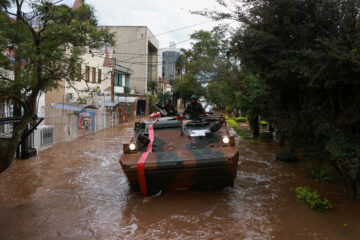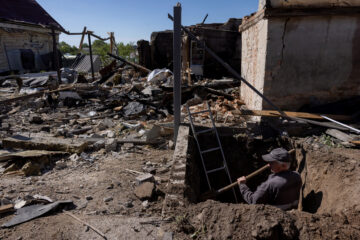US, Russia start talks on Syrian chemical weapons
U.S. Secretary of State John Kerry and his Russian counterpart Sergei Lavrov started talks late Thursday in Geneva aimed at getting Syria to dismantle its chemical weapons arsenal.
Lavrov and Kerry said they hoped the plan could avoid military action against Syria.
The UN has confirmed it has received documents from Syria on joining the Chemical Weapons Convention, a key step in the Russian plan.
In a news conference ahead of a working dinner in Geneva, Foreign Minister Lavrov said the resolution of the chemical weapons issue in Syria would make any military strike by the United States unnecessary.
He said there had to be a move away from military confrontation, and that successful talks could lead to a "Geneva 2" meeting.
Secretary of State Kerry said that only the threat of force had spurred Syria to accept relinquishing its chemical weapons, but that he hoped diplomacy could prevent military action.
He said the expectations for the meeting were high – particularly for Russia.
Kerry said: "This is not a game… it has to be real, it has to be comprehensive, it has to be verifiable, it has to be credible, it has to be… implemented in a timely fashion… Finally, there ought to be consequences if it doesn\’t take place."
He added: "President Obama has made clear that should diplomacy fail, force might be necessary."
The Syrians\’ use of the phrase "standard practice" in supplying information to the UN appeared to irk Kerry.
"There is nothing standard about this process at this moment because of the way the regime has behaved," he said.
Lavrov appeared to admonish Kerry for making a political address, saying: "Diplomacy likes silence". Kerry failed to hear the translation of Lavrov\’s final words and asked to hear them again.
Lavrov said in English, "It\’s OK, John", only for Kerry to say, smiling: "You want me to take your word for it – it\’s a little early for that."
Syrian President Bashar Assad said Thursday that Syria will put its chemical weapons arsenal under international control in response to a Russian proposal and not because of the threat of a U.S. military strike.
Assad made the statement in an interview with Russian state TV which was televised on Thursday, as John Kerry, US secretary of state, landed in the Swiss city of Geneva to meet his Russian counterpart Sergey Lavrov and discuss how UN can secure and destroy Assad\’s chemical weapons.
"Syria is placing its chemical weapons under international control because of Russia. The US threats did not influence the decision," Interfax quoted Assad as telling Russia\’s state-run Rossiya-24 channel.
Assad also told Rossiya-24 that Syria would submit documents to the UN for an agreement governing the handover of its chemical arsenal, state-run Russian news agency RIA reported on Thursday.
Rossiya-24 did not immediately air the interview and it was not clear when it was recorded.
Russian President Vladimir Putin has directly appealed to the American people and to US politicians on Syria by writing an article in the New York Times warning that a military strike could unleash a new wave of "terrorism".
Writing in the newspaper on Thursday, Putin said there were "few champions of democracy" in the 2-1/2-year-old civil war in Syria, "but there are more than enough Qaeda fighters and extremists of all types battling the government."
Putin stressed in a New York Times opinion piece the need to work through the United Nations and not conduct unilateral military action in Syria. He said a U.S military strike "would increase violence and unleash a new wave of terrorism," and could negatively effect efforts to address Iran\’s nuclear program and the Israeli-Palestinian peace process.
Putin also said there is "every reason" to believe opposition fighters were the ones responsible for using chemical weapons in Syria in a bid to draw an outside military response. The U.S. has blamed the Syrian government for using poison gas against civilians.
Meanwhile, Kerry and his Russian counterpart Sergei Lavrov are due to meet Thursday in Geneva to discuss the details of the Russian-proposed plan for Syria to give up its chemical weapons to the United Nations to be destroyed.
The chief of the rebel Free Syrian Army Salim Idris rejected Russia\’s proposal in a video posted online, saying the international community should not only remove the weapons, but also punish those responsible for using them.
President Barack Obama this week cautiously endorsed Russia\’s diplomatic initiative, but said the U.S. military will be ready to respond if diplomacy fails
The U.S. says 1,400 people were killed when Syrian forces used poison gas against civilians last month near Damascus.
President Obama says U.S. ships in the Mediterranean region are staying in place to keep pressure on the Syrian government to live up to any agreement on giving up its chemical weapons. Kerry has said reaching any agreement to remove the chemical-weapons threat in Syria will be "exceedingly difficult."
The Syrian stockpile is one of the world\’s largest, and is scattered at sites across the country.
Envoys from the five permanent members of the U.N. Security Council — Britain, China, France, Russia and the United States — are discussing a possible resolution for securing and dismantling Syria\’s chemical weapons.
Russia has already said it will block any attempt to include the potential use of military force against Syria to ensure it complies with any order.
More than 100,000 people have been killed in the conflict, and the UN refugee agency says about one third of Syria\’s pre-war population of 20.8 million have fled their homes, either to other countries or safer areas within Syria.
Source: Agencies
[do_widget_area inner_adsbar]










